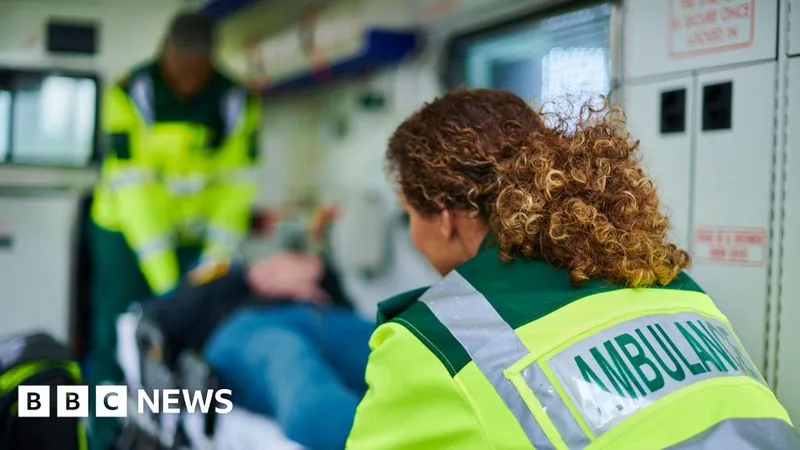
Flu Cases Surge Dramatically in England's Hospitals: Are We Facing a Crisis?
2025-01-03
Author: Li
Surge in Flu Cases
The National Health Service (NHS) in England has issued a stark warning as flu cases in hospitals have skyrocketed in the past month, reaching alarming levels. Current statistics reveal a troubling increase in hospital admissions due to the flu, with over 5,000 patients reported by the end of last week—a staggering 350% rise compared to the same week last year. While this number is not as high as the peaks seen in 2022, the situation is severe enough to be labeled “unacceptably awful” by healthcare leaders.
Health officials have raised concerns about the potential impact of imminent frigid weather, predicting that the cold snap could exacerbate conditions for vulnerable patients and further strain the healthcare system. Professor Julian Redhead, the NHS’s national clinical director for urgent and emergency care, emphasized that flu cases are sharply increasing, with some days witnessing over 5,000 new admissions linked to the virus.
“Low temperatures can pose significant risks for individuals with respiratory ailments or other vulnerabilities,” said Prof. Redhead, urging those at risk to stay warm and ensure they have an adequate supply of medications.
The Hospital Crisis Deepens
Hospitals are grappling with unprecedented pressure as they work to accommodate the surge in flu and other seasonal viruses, including COVID-19 and norovirus. To mitigate the impact, emergency services have been bolstered with additional beds and home-based care options. However, NHS Confederation's chief executive, Matthew Taylor, stated that the healthcare system remains critically vulnerable, as local services are now feeling the strain.
Recent figures highlighted the extent of the crisis, with 12,200 patients left in ambulances for over an hour before receiving care. Dr. Adrian Boyle from the Royal College of Emergency Medicine noted that emergency departments are overwhelmed, leading to an increase in “avoidable harm” and unnecessary deaths.
He criticized the chronic shortage of hospital beds and highlighted the long-awaited reform of social care—a topic that the health and social care secretary addressed in a recent announcement, though changes won’t be implemented until after 2028.
Hospitals across various regions in England have begun limiting visitor access and implementing face mask mandates to control flu transmission. This trend isn’t confined to England; there has been a notable increase in flu hospitalizations in Scotland as well, prompting acknowledgment from First Minister John Swinney about the substantial pressures facing the NHS.
Understanding the Symptoms and Risks
Flu symptoms can escalate quickly and typically include:
- Sudden high fever
- Body aches
- Extreme fatigue
- Dry cough
- Sore throat
- Headaches
- Nausea
Both children and adults are equally susceptible. During the autumn and winter months, free vaccines are accessible to high-risk groups, which include individuals over 65, those with chronic health conditions, pregnant women, and frontline healthcare workers.
Despite ongoing efforts to encourage vaccinations, uptake numbers suggest that many eligible individuals remain unprotected. Poor vaccination rates can lead to severe seasonal flu outbreaks, impacting both public health and the burden on the NHS.
What Lies Ahead?
As the winter flu season progresses, health officials anticipate that the situation may become increasingly dire if vaccination rates do not improve. Factors such as social gatherings during the holiday season contribute to the rapid spread of the virus.
The current flu wave appears to have begun earlier than expected, and health authorities have been proactive in urging vaccinations. Nonetheless, the reality remains that many have not heeded the warnings, potentially leading to further cases and strains on medical resources.
While most individuals recover from flu within weeks, the virus can pose serious risks—especially for those with underlying health conditions. Each year, thousands fall victim to flu-related complications, underscoring the importance of public awareness and vaccination efforts.
In this critical time, the question remains: how can the nation best prepare for the continuing risks of flu and ensure that the NHS can withstand the heightened pressures? The coming weeks will be crucial in determining the trajectory of this ongoing health crisis.

 Brasil (PT)
Brasil (PT)
 Canada (EN)
Canada (EN)
 Chile (ES)
Chile (ES)
 Česko (CS)
Česko (CS)
 대한민국 (KO)
대한민국 (KO)
 España (ES)
España (ES)
 France (FR)
France (FR)
 Hong Kong (EN)
Hong Kong (EN)
 Italia (IT)
Italia (IT)
 日本 (JA)
日本 (JA)
 Magyarország (HU)
Magyarország (HU)
 Norge (NO)
Norge (NO)
 Polska (PL)
Polska (PL)
 Schweiz (DE)
Schweiz (DE)
 Singapore (EN)
Singapore (EN)
 Sverige (SV)
Sverige (SV)
 Suomi (FI)
Suomi (FI)
 Türkiye (TR)
Türkiye (TR)
 الإمارات العربية المتحدة (AR)
الإمارات العربية المتحدة (AR)